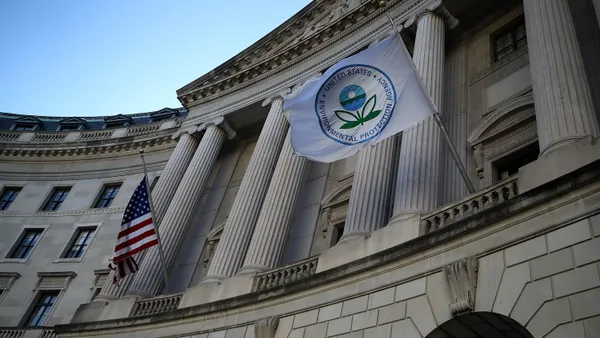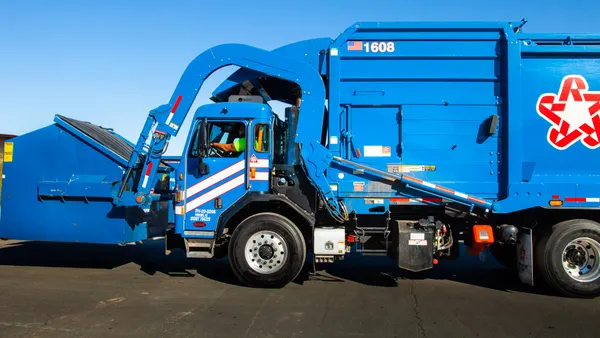Editor's note: This article has been updated to include the full list of groups that co-sponsored the event.
Dive Brief:
- New York's Business Integrity Commission (BIC) hosted the third Trade Waste and Recycling Safety Symposium Oct. 24, following what Commissioner Dan Brownell described as a string of "rough months" for crashes in the local industry. After showing an emotional video of families describing fatal crashes, Brownell emphasized the need for drivers to take responsibility despite the challenges of a growing population. "We as a city, we as a community, we as an industry can do this," he said.
- Drivers and fleet operators said avoiding cyclists or pedestrians has become increasingly difficult. According to the city's Department of Transportation, annual bicycle trips in New York jumped by 150% between 2006 and 2016. The rate of cyclist injuries has decreased during that time, but some feel the attendant increase in bike lanes or other infrastructure has made collections more complicated.
- Companies are also seeing these changes near their transfer stations, as residential and commercial tenants move into formerly industrial neighborhoods. One session highlighted how local company Mr. T Carting has worked with a new nightclub nearby — at the venue's expense — to coordinate traffic and pedestrian controls during peak operating hours overnight.
Dive Insight:
The New York commercial waste safety conversation has evolved rapidly in recent years, due in part to increased scrutiny amid the push for a zone collection system and the city's "Vision Zero" initiative to eliminate traffic fatalities. This led both BIC and the Department of Sanitation to increase their involvement in what has been portrayed by some as an industry lacking sufficient regulation. Since the city's first safety symposium was held in summer 2016, and the second in spring of this year, more companies have invested in new technology and changed their training programs. BIC hopes to continue that trend with the release of a new safety manual in the coming months.
Though, as alluded to by Brownell, local private collection vehicles have still been involved in multiple fatal crashes this year. The fact that such incidents continue, and dozens of companies still aren't attending these free safety events, has worked against the case that internal reform is happening fast enough. The event was also co-sponsored by New Yorkers for Responsible Waste Management, the Solid Waste Association of North America and the National Waste & Recycling Association, showing broad support from industry trade groups.
Among those that did attend and were supportive, there was still a sense that even with the best intentions it is increasingly difficult to operate on the streets of New York. The uptick in pedestrians, cyclists, changing lane patterns, obstructive sidewalk trees and new neighbors in industrial areas were all mentioned throughout the morning. Questions about whether cyclists are getting the same level of scrutiny were common, during what was the most active of the event's sessions.
"Safety is a partnership," said Bonacio Crespi, a driver for M&M Sanitation, during the bicycle session. "Everybody needs to share that responsibility."
Attendees mentioned multiple times that the responsibility extends to supervisors and company owners when it comes to routing expectations. If drivers feel rushed to complete heavy routes, they may not feel as able to make safer choices that could slow them down. As local service providers are expected to be doing more in terms of commercial recycling and organics diversion — at a time when margins are growing thin due to commodity drops — these operating pressures are becoming harder to ignore.
Fairly or not, some reform advocates and elected officials find it hard to empathize with these operational challenges when safety issues continue to occur. The need for all involved to have more open discussions and recognize each other's viewpoints will only become more necessary as New York's population continues to grow. If the city is going to make real progress on its aspirational "Vision Zero" or "zero waste" goals, further collaboration will be critical.









